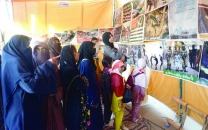Sindh CM discusses Water Apportionment Accord model with Australian experts in Karachi
Meetings reviews the efforts made under the MoU on water between the two countries

Sindh CM Murad Ali Shah. PHOTO: PPP/ TWITTER
This was said by the Sindh Chief Minister (CM) Syed Murad Ali Shah on Thursday while discussing Water Apportionment Accord model with experts of Australian Aid Delegation led by Australian High Commissioner Margret Adamson. Other participants of Australian Aid include First Secretary Emma Leahey, Australian Centre of International Agriculture Research (ACIAR) representative Muawaz Kazmi, Manager Water Hamza Khalid, Common Wealth Scientific and Industrial Research Organistaion (CSIRO) Principal Scientist Dr Mobin Ahmad and others.
Sindh CM orders immediate restoration of closed RO plants
The CM was assisted by his special assistant Ashfaq Memon, Principal Secretary Sajid Jamal Abro, Irrigation Superintendent Engineer Zareef Iqbal Khero and Irrigation XEN M Shahbaz.
The Australian CSIRO delegation displayed a presentation to the CM and senior government officials on the collaborative work that was done as part of the memorandum of understanding (MoU) on water between the Australian and Pakistan governments. The work comprises a river stem model of the Indus basin in Pakistan and the associated tool for modelling the 1991 Water Apportionment Accord.
The CM appreciated the efforts and said that this tool would be useful for exploring different interpretations of provincial sharing arrangements as well as understanding the potential impacts of climate change and dam sedimentation on Sindh's water security.
The meeting also discussed the Water Sector Task Force Report which outlined a range of significant pressures and issues facing the Indus basin in Pakistan. The report calls for requirement for a repeatable system/evidence base to quantify the major water balance terms and then objectively plan for climate change, infrastructure ($26 billion proposed investment), development, water sharing according to interprovincial Water Apportionment Accord, food and economic security, secure and productive and sustainable cities. They also urged building knowledge and capacity of concerned officers, recommended the implementation of Australian water management technologies and associated capacity building.
Sindh lawmakers accuse Centre of unequal water distribution
The meeting highlighted that the integrated water resource assessment, data management, modelling and capacity building were necessary to support national water planning and policy development.
Scenarios and outlook of agricultural production, food security, water use and livelihood outcomes under changing climate, increasing population and infrastructure development should be part of the plan.
The Australian authorities recommended the Indus Integrated Modelling Framework (IIMF) under which they have suggested that surface water allocation should be made by working out seasonal forecasts by assessing climate and rainfall which includes glacier, snow and rain.
The surface water allocation should be made keeping in view the demand based on field scale of irrigation, hydropower, urban and environmental requirements based on availability of ground water, fresh and saline. Meanwhile, trend analysis may also be made for water availability and use, agriculture production and population growth.
The CM engaged his water experts of irrigation department with the Australian experts to work out further details of the model so that it could be implemented in the larger interest of people of Sindh.
Published in The Express Tribune, March 29th, 2019.



















COMMENTS
Comments are moderated and generally will be posted if they are on-topic and not abusive.
For more information, please see our Comments FAQ